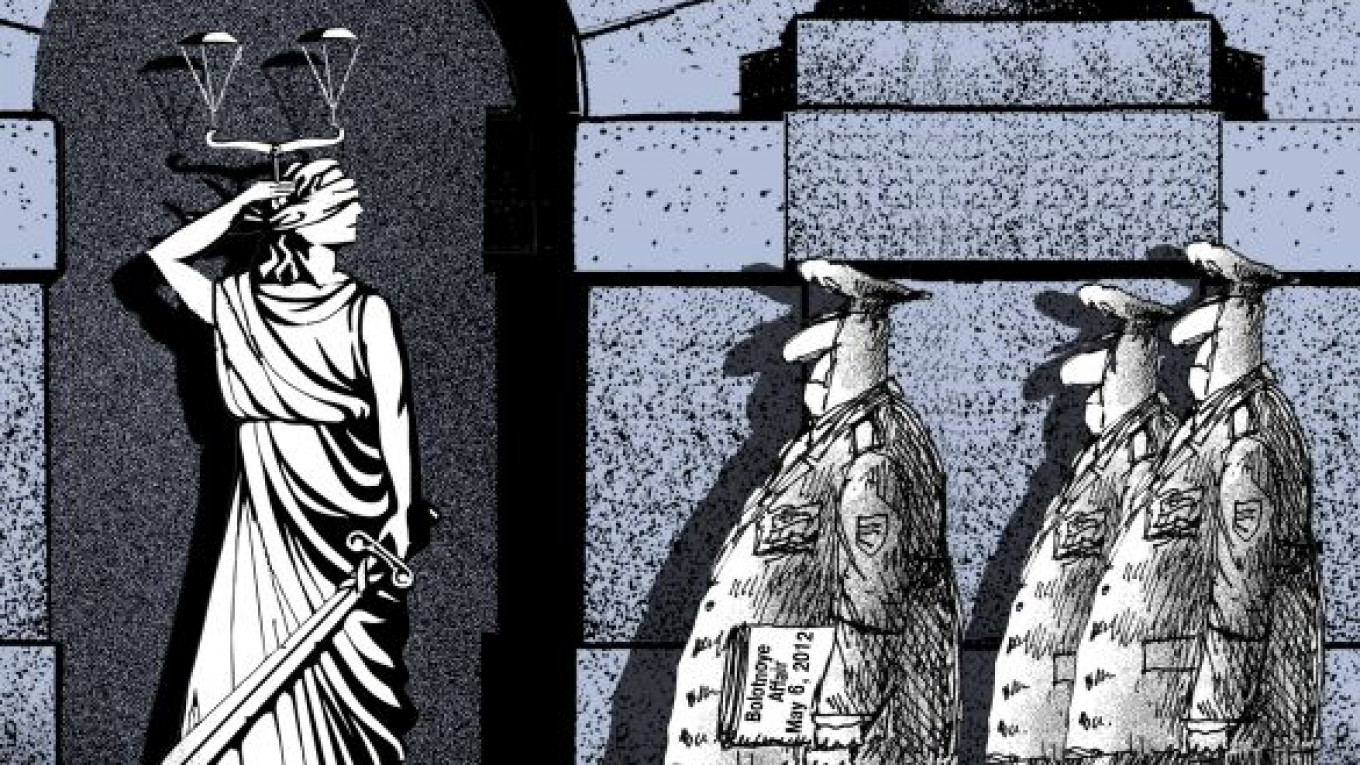For the first time since 1991, the Kremlin is planning a collective criminal tribunal that is reminiscent of Soviet leader Josef Stalin's infamous "Moscow Trials" of 1936-38. The charges are just as unfounded and absurd as those of almost 80 years past, and investigators are just as determined to provide evidence of a "foreign-funded anti-government conspiracy."
The "Bolotnoye affair," a series of trials against participants in the May 6, 2012, rally on Moscow's Bolotnaya Ploshchad, has brought Russia back to Stalin's era. Nearly 30 defendants are accused of orchestrating and participating in a "mass riot," but in reality they were drawn into what amounted to little more than a scuffle with the police that the officers themselves had planned and provoked. Fortunately, the accused will not be executed as their counterparts were in the 1930s, but under President Vladimir Putin even participation in a peaceful demonstration can lead to a lengthy jail term.
To date, charges have been filed against 27 people, one of whom — Maxim Luzyanin — has already been sentenced to 4 ½ years in prison. Fifteen have already spent months in pretrial detention, seven have been barred from leaving the country, two are the subject of manhunts, and two other defendants, including Left Front leader Sergei Udaltsov, are being held under house arrest.
In the Moscow Trials of 2013, the role of Trotsky was given to Georgian politician Givi Targamadze, while two dozen ordinary Russians have been criminally charged with participating in a "mass riot."
The Moscow Trials of 1936-38 targeted Leon Trotsky, who Stalin had demonized as a traitor even though Trotsky had been living abroad since 1929, when he was deported from the Soviet Union. Stalin claimed Trotsky had issued orders from abroad to assassinate him. Trotsky was also accused of instructing his supporters to commit acts of sabotage throughout the Soviet Union.
In the Moscow Trials of 2013, the role of Trotsky was given to Georgian politician Givi Targamadze, who has been charged with financing and instructing Udaltsov and his associates to organize an Orange-like revolution in Russia and overthrow the Putin regime.
According to investigators, on May 6, 2012, the day before Putin's inaugural cavalcade drove through empty streets, mass riots broke out that had been planned by the rally's organizers, who the authorities have identified as Udaltsov, Leonid Razvozzhayev and Konstantin Lebedev, and financed by Targamadze. A few police officers were injured, the city suffered damage to a few square meters of asphalt, and some outdoor portable toilets were turned over.
Article 212 of the Criminal Code defines riots as "pogroms, arson, the destruction of property, the use of firearms, explosives or explosive devices." But there were none of these elements on May 6.
The Public Inquiry Commission, which was formed by the RP-Party of People's Freedom and the May 6 Committee, reviewed statements made by more than 600 eyewitnesses and examined hundreds of video and photographic records of the event. Last week, the commission published its findings and made them available to the public in a document of more than 700 pages.
The commission's investigation concluded that no riots occurred on May 6. Instead, there were only peaceful demonstrators who were defending themselves against unlawful aggression and provocation by the police. In violation of the route approved beforehand, the authorities forced hundreds of people into a narrow bottleneck as they tried to enter the square. The police pushed them back, thereby creating panic and a stampede. What's more, the police wore clothing that bore no identification of their status, making it impossible to know who was a protester and who was representing the authorities. Finally, the police detained large numbers of people without cause.
The Public Inquiry Commission concluded that the peaceful rally escalated into clashes with police mainly because the authorities altered the route of the march without consulting the organizers. Furthermore, a number of witnesses reported seeing provocateurs in masks throwing bottles and pieces of asphalt at the police. It is also noteworthy that not one of those provocateurs was later identified, detained or charged. As for the asphalt, eyewitnesses testified that some of it had been broken up by municipal services workers the day before, and the pieces lay in neat piles on the square.
The Public Inquiry Commission believes that the actions of the authorities during the rally at Bolotnaya Ploshchad were politically motivated and that government investigators were biased and corrupt. The commission's materials will be submitted to the Prosecutor General's Office, the Investigative Committee, the European Court of Human Rights in Strasbourg, the Council of Europe, the Organization for Security and Cooperation in Europe and the United Nations. What's more, the commission will continue its work until all of the defendants are set free and the law enforcement officials who violated the law are brought to justice.
Vladimir Ryzhkov, a State Duma deputy from 1993 to 2007, hosts a political talk show on Ekho Moskvy radio and is a co-founder of the opposition RP-Party of People's Freedom.
A Message from The Moscow Times:
Dear readers,
We are facing unprecedented challenges. Russia's Prosecutor General's Office has designated The Moscow Times as an "undesirable" organization, criminalizing our work and putting our staff at risk of prosecution. This follows our earlier unjust labeling as a "foreign agent."
These actions are direct attempts to silence independent journalism in Russia. The authorities claim our work "discredits the decisions of the Russian leadership." We see things differently: we strive to provide accurate, unbiased reporting on Russia.
We, the journalists of The Moscow Times, refuse to be silenced. But to continue our work, we need your help.
Your support, no matter how small, makes a world of difference. If you can, please support us monthly starting from just $2. It's quick to set up, and every contribution makes a significant impact.
By supporting The Moscow Times, you're defending open, independent journalism in the face of repression. Thank you for standing with us.
Remind me later.








